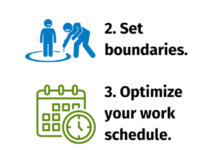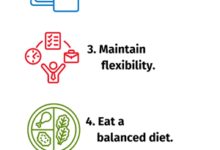Successfully Navigating the Night Shift
Page reviewed and updated: August 2023
Working the night shift is often a non-negotiable requirement for new nurses working in hospital settings. Some nurses enjoy working the night shift and have managed to make it their lifestyle. There are some benefits to the off shift. You can schedule activities during the day, avoid distractions at night from administrative personnel and visitors, escape institutional politics, and receive higher pay (Morelock, 2017). However, studies have shown that night shift can have serious negative physical, psychological, and psychosocial health effects on nurses and their job performance (Books et al., 2020). Let’s look at how sleep deprivation can impact nurses and review helpful strategies to successfully navigate the night shift.
Understanding Your Internal Clock
We all need sleep, ideally seven or more hours every night. Two factors that can impact natural sleep are chronotype and insomnia vulnerability (Lee et al., 2015). Chronotype or chronobiology is your internal clock or circadian rhythm (Crooks, 2017) which dictates how much sleep you need and what time you sleep best. You might consider yourself a morning-person, evening-type or a night owl. Your chronotype is associated with your mental health, sleep pattern, personality traits and stress vulnerability. A study conducted by Lee et al. (2015) found that participants who worked the evening shift had the most significant issues with falling asleep. They also found that nurses with evening chronotype were more vulnerable to insomnia. Insomnia vulnerability refers to the degree in which stress can cause transient insomnia and ultimately chronic insomnia (Lee et al., 2015). Individuals with high insomnia vulnerability are easily aroused and have poor coping techniques when managing stress.
Strategies to Help You Survive the Night Shift
Night shift is taxing both physically and emotionally. Shift work has been associated with sleep disturbances, disrupted circadian rhythms, altered physical and mental health, unsettled family life, complicated interpersonal relationships, and a decrease in the quality of nursing care (Lee et al., 2015). Working nights without adequate sleep during the day can impair work performance and negatively impact direct patient care. Fatigue alters judgment making individuals prone to mistakes.
There are a variety of approaches that nurses take to manage working night shifts. Some nurses embrace a “night stay” program in which they adapt every aspect of their life to the night shift (Morelock, 2017). This approach works best if you live in a large city with 24-hour services, but it is difficult to maintain permanently. The most common approach is the “no-sleep” program. On the first day of the first night shift after time off, stay awake all day, then work a 12-hour night shift. Unfortunately, your cognitive functioning is significantly diminished after as little as 17 hours of no sleep (Morelock, 2017). Another option is the “nap proxy” in which you take a 1- to 2-hour nap right before the start of your night shift.
Regardless of the approach you adopt, integrate these helpful strategies to improve your sleep hygiene while working night shift (Crooks, 2017; Morelock, 2017):
-
Give yourself permission to sleep during the day.
-
Prioritize sleep and allow adequate time to obtain at least 7 hours of continuous rest.
-
Develop a non-stimulating routine prior to bedtime and stick to it!
-
Eat light meals in the few hours prior to sleep.
-
Drink caffeinated drinks early during the night shift; avoid caffeine toward the end of the shift.
-
Limit bright lights and screen time about an hour before bed; blue wavelength light is disruptive to your brain and melatonin secretion.
-
Clear your mind before sleep.
-
Make a to-do list for the next day so your mind is not consumed trying to remember things.
-
Avoid thinking about the things you feel you should be doing while you are sleeping and instead focus on the benefits of sleep.
-
Don’t worry about getting enough sleep as this can delay falling asleep.
-
-
Block out normal daytime noise.
-
Wear ear plugs.
-
Use white noise (fan, sound machine).
-
Switch telephones to silent mode.
-
-
Keep your bedroom dark and cool.
-
Use window coverings to maintain darkness while you sleep.
-
The ideal room temperature for sleeping is between 60- and 68-degrees Fahrenheit; higher temperatures will prevent the body from cooling itself making it difficult to fall asleep.
-
-
Try relaxing exercises before bed to unwind such as progressive muscle relaxation.
-
Take a deep breath, tighten your feet and leg muscles, then release the tension as you exhale; work your way up your body to the thighs, stomach and shoulders, finishing with slow, deep breaths.
-
-
Use caution when taking over the counter (OTC) and prescription sleep aids as long-term use can lead to physical and psychological dependence.
-
Use a light machine to help your body realize the time to wake up.
In addition to the strategies listed above to improve your sleep during night shift, there are other general health practices that you can implement for an overall healthier outlook (Crooks, 2017):
-
Change your mindset; look at night shift not as a burden but an opportunity.
-
Accept shift work as a requirement of your job.
-
Look at the big picture – night shift is just one aspect of your job.
-
Find humor in working night shift – things certainly happen at night that don’t necessarily happen during day shift.
-
Stay positive!
-
-
Maintain self-care, do things to help maintain your physical and emotional health.
-
Exercise – helps manage stress and improve sleep; try yoga, walking, or swimming.
-
Socialize – maintain your relationships and spend time with family and friends.
-
Eat a healthy diet – eat food high in fiber and protein; avoid processed foods loaded with sugar.
-
-
Practice gratitude.
-
Hydrate to boost alertness.
There’s a special camaraderie and culture that comes with the night shift – it’s almost a rite of passage. While there are physical and emotional effects of working when your body wants to sleep, remember the strategies from this article to help you successfully navigate shift work.
References
Books, C., Coody, L.C., Kauffman, R. & Abraham, S. (2020). Night shift work and its health effects on nurses. The Health Care Manager. 39(3), 122-127. https://doi.org/10.1097/HCM.0000000000000297
Crooks, L. (2017). Simple strategies for surviving the night shift. Critical Care Nursing Quarterly. 40(2), 155-161. https://doi.org/10.1097/01.NURSE.0000526889.33176.10
Lee, C., Chen, H., Tseng, M.M., Lee, H. & Huang, L. (2015). The relationships among sleep quality and chronotype, emotional disturbance, and insomnia vulnerability in shift nurses. The Journal of Nursing Research. 23(3), 225-235. https://doi.org/10.1097/jnr.0000000000000095
Morelock, S.G. (2017). The night shift: Follow the evidence to survive and thrive. Nursing2017. 47(12), 46-51. https://doi.org/10.1097/01.nurse.0000526889.33176.10
More Reading and Research







